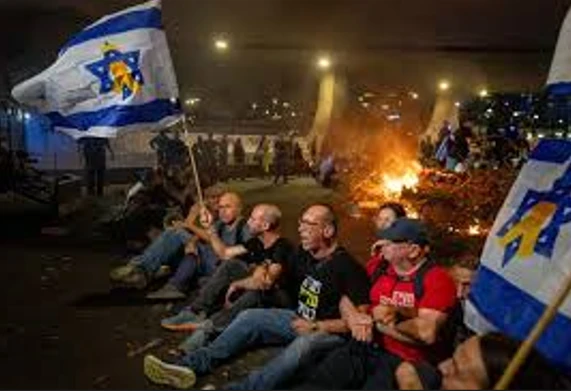Israel's main union on Sunday ordered a nationwide general strike after soldiers recovered the bodies of six killed hostages from the Gaza Strip where the military is battling Palestinian militants.
In the evening, tens of thousands of Israelis gathered in the streets of Tel Aviv and other cities to protest the government and call for a hostage release deal.
The bodies of the six hostages were recovered Saturday "from an underground tunnel in the Rafah area" in southern Gaza, the military said.
They were among 251 hostages seized during Hamas's October 7 attack on Israel that triggered the war, 97 of whom remain captive in Gaza, including 33 the army says are dead.
Scores were released during a one-week truce in November, but relatives believe not enough is being done to free those still held.
Campaign group the Hostages and Missing Families Forum said a negotiated "deal for the return of the hostages" was urgently needed.
"Were it not for the delays, sabotage and excuses" in months of mediation efforts, the six hostages "would likely still be alive", a statement said.
The families called for a nationwide general strike to force the government to reach a deal.
Shortly afterwards, the head of Israel's powerful Histadrut trade union ordered a "complete strike" on Monday in support of the hostages.
- 'Unacceptable' -
"I have come to the conclusion that only our intervention can shake those who need to be shaken," Histadrut chair Arnon Bar-David said in a statement.
"A deal is not progressing due to political considerations and this is unacceptable."
During protests in Tel Aviv, demonstrators blocked a highway and confronted authorities, police said in a statement, "forcing" them to declare the protest illegal and disperse the crowd.
The six hostages were named as Carmel Gat, Eden Yerushalmi, Almog Sarusi, Ori Danino, US-Israeli Hersh Goldberg-Polin and Russian-Israeli Alexander Lobanov.
Military spokesperson Daniel Hagari said all six "were abducted alive on the morning of October 7" and "brutally murdered by Hamas terrorists shortly before we reached them".
Qatar-based Hamas official Izzat al-Rishq said they were "killed by Zionist (Israeli) bombing", an accusation the military denied.
Israeli health ministry spokesperson Shira Solomon said the hostages were "murdered by Hamas terrorists with several close-range gunshots", about 48-72 hours before their autopsies.
A senior Hamas official told AFP on condition of anonymity that "some" of the six had been "approved" for release in a potential hostage-prisoner swap under a deal yet to be agreed.
Critics in Israel have accused Prime Minister Benjamin Netanyahu of prolonging the war for political gain.
Netanyahu asked Lobanov's parents on Sunday for "forgiveness for not succeeding in bringing Sasha back alive".
- West Bank attack -
US President Joe Biden said he was "devastated and outraged" by the hostages's deaths, but told reporters he was "still optimistic" a deal could be reached.
The Biden administration has been leading ceasefire mediation efforts along with Qatar and Egypt.
Calling for an end to the war, French President Emmanuel Macron said he felt "shock and indignation" at the killing of the six hostages.
In the occupied West Bank, as soldiers pressed day five of raids targeting Palestinian militants, Israeli police said a "shooting attack" killed three officers.
It took place near the Tarqumiya checkpoint in the Hebron area in the southern West Bank.
The military said it "eliminated" the suspected attacker after surrounding a house.
At least 24 Palestinians, including 14 that militant groups said were their members, have been killed since the raids began on Wednesday.
One 20-year-old soldier was killed Saturday in what Israel's military has called "counter-terrorism" operations.
In the northern West Bank, an AFP photographer saw Israeli bulldozers in Jenin city centre, a day after an official said soldiers had destroyed most of the streets and power and water had been cut off in the adjacent refugee camp.
Later Sunday an AFP photographer heard loud explosions near the camp and saw black smoke over Jenin.
The United Nations said Wednesday that at least 637 Palestinians had been killed in the territory by Israeli troops or settlers since the Gaza war began.
Twenty-three Israelis, including soldiers, have been killed in Palestinian attacks or during army operations over the same period, according to official figures.
- Polio vaccinations -
In the besieged Gaza Strip, "humanitarian pauses" in the nearly 11-month war between Israel and Hamas were due to take place to facilitate a massive polio vaccination drive which a health official said began in earnest Sunday.
Hamas's October 7 attack resulted in the deaths of 1,205 people, mostly civilians, according to an AFP tally based on Israeli official figures.
Israel's offensive has killed at least 40,738 people in Gaza, according to the Hamas-run territory's health ministry. The UN rights office says most of the dead are women and children.
The fighting has devastated Gaza, repeatedly displaced most of its 2.4 million people and triggered a humanitarian crisis.
Water, sanitation and medical facilities have been ravaged, contributing to the spread of preventable disease.
The World Health Organization has said Israel agreed to a series of three-day "humanitarian pauses" to facilitate the campaign that aims to vaccinate around 640,000 children, after the first confirmed polio case in Gaza in 25 years.
On Sunday, it was formally launched at three health centres in central Gaza, said Yasser Shaaban, director of Al-Awda hospital.
"We hope this vaccination campaign for children will be calm," said Shaaban, noting there were "a lot of drones" flying overhead.
The health ministry in Gaza said late Sunday that 72,611 children were vaccinated on the first day of the campaign.
Gaza health officials said an air strike targeting police in a school sheltering displaced Palestinians killed at least 11 people on Sunday.
Israel's military said it hit a Hamas command centre.


